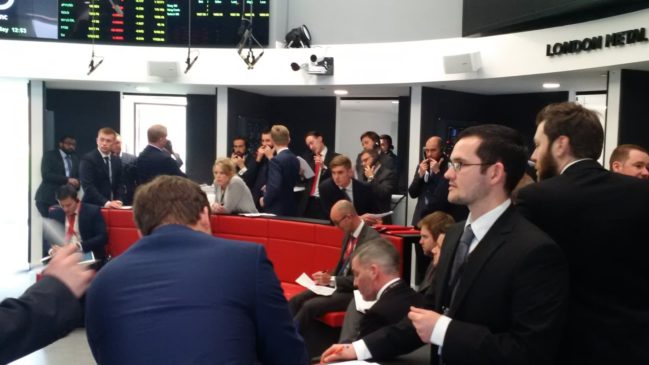Traders operate in the Ring, the open trading floor of the new London Metal Exchange (LME) in central London.
Matt Clinch | CNBC
LONDON — A second U.S. firm has sued the London Metal Exchange for $15.3 million over canceled nickel trades in March.
Jane Street Global Trading filed a judicial review claim in the English High Court on Monday, a memo from LME-owner Hong Kong Exchanges and Clearing (HKEX) confirmed.
The filing from the U.S. market maker comes just days after hedge fund Elliott Associates filed a suit for $456 million relating to the same chaotic morning in March.
The LME suspended trading activity and cancelled nickel trades on March 8 due to a spike in volatility, which saw nickel prices double to a record $100,000 per ton in the space of a few hours.
‘Exceeded its powers’
A spokesperson for Elliott confirmed that it has initiated judicial review proceedings against the LME.
“Elliott considers that when the LME cancelled Nickel trades on 8th March 2022 it acted unlawfully in that it exceeded its powers when it cancelled those trades, or that it exercised the powers that it did have unreasonably and irrationally in particular by taking into account irrelevant factors (including its own financial position) and failing to take into account relevant factors,” the spokesperson added.
In a statement Tuesday, Jane Street said it had taken action to recoup its losses caused by the LME’s “illegal actions” and to “strengthen the exchange and restore the market’s trust in it.”
“The LME’s arbitrary decision to cancel nickel trades during a period of heightened volatility severely undermines the integrity of the markets and sets a dangerous precedent that calls future contracts into question.”
The wild trade in the nickel market in early March came around two weeks after Russia’s invasion of Ukraine, which prompted supply fears that sent commodity prices spiralling upward across the board.
Extreme price moves in Asian trading hours overnight sent the market into a frenzy as dawn broke in London. Russia is the world’s third-largest producer of nickel — a key ingredient in stainless steel and a major component in lithium-ion batteries.
However, in the weeks following the attack, banks began cutting their exposure to Russian commodities, and shipping giants swerved the country’s key ports.
Shortly after nickel prices soared past $100,000 per ton Saxo Bank Head of Commodity Strategy Ole Hansen told CNBC that it was a “very dangerous market” that was “not driven by supply and demand” but rather by “fear.”
‘Without merit’
A spokesperson for the LME said in a statement on Tuesday that the exchange took the view that the nickel market in the early hours of March 8 had “become disorderly,” and therefore took the decision to suspend trading in nickel contracts from 8:15 a.m. U.K. time, and to cancel trades executed after 00:00 U.K. time.
The LME said the aim was to “take the market back to the last point in time at which the LME could be confident that the market was operating in an orderly way.”
“At all times the LME, and LME Clear, sought to act in the interests of the market as a whole. The LME therefore considers that Elliott’s and Jane Street’s grounds for complaint are without merit, and the LME will defend any judicial review proceedings vigorously,” the spokesperson added.
Sarah Taylor, partner in the global commodities group at international law firm Holman Fenwick Willan, told CNBC on Tuesday that the LME has a responsibility to maintain an orderly market, so it would be “challenging to argue that its decision to suspend trading was inappropriate” given the unprecedented turbulence in nickel prices at the time.
“But the position with cancelling trades may not be as straightforward, and where a party has a very significant loss, it is natural that they will look at their legal options,” Taylor added.
“The Court may need to consider not only the rationale for the LME’s decision to cancel trades, but also the consequences.”



